We are posting our China trip report in reverse order, starting with Beijing, our last stop.
Gui's impressions
北京是我们这次行程的最后一站。经过江南的赤日炎炎,北京的天气竟令我们”如沐秋风“,大赞凉快,十分意想不到。空气质量似乎也比记忆中大有改善?--一个星期里竟出现了两次蓝色的晴天。幸福啊!
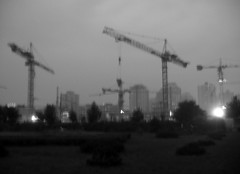
进入北京,巨大的倒计时牌显示着“离奥运会开幕...774天”,使我想起了很久以前,高考的前夕。。。显然一切都在围绕奥运会运转:整个北京城就象一个大工地,每条街道都在挖沟挖坑,放眼望去,到处都是此起彼伏的大老雕(有人说它们就是中国的国鸟)。 在这种日夜施工的状况下,北京的交通比我记忆中的还要糟糕。但全城堵得最水泻不通的地方还要数中关村。虽然这里并没修路,却是每时每刻都在堵车,十分令人不解。出租车司机告诉我们:都说美国的路是聪明人给傻子设计的,北京的路却是傻子给聪明人设计的。。。
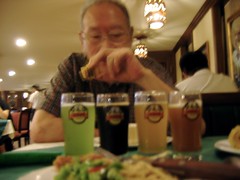
我们在北京的主要活动就是大吃大喝。到北京的第一天妈妈就给我们写了一个喂猪大纲,上面列举我们要去的饭馆们,从北京烤鸭到巴西烤肉,从绍兴”孔乙己“到湖北”九头鸟“。。。这样连日紧张的餐饮活动使我们的肚子总是填得满满的,常常面对一桌美食都心有余而力不足了。
瞎拼 . 划船
除了大吃大喝之外,我们的另一主要活动便是瞎拼 --瞎拼者,shopping也。以前在网上看到这个新发明的词觉得很有趣,终于用上了。而且用在此处很合适,因为在这里买东西就要讨价还价,对我来说有点又瞎又拼的感觉,象一种游戏。Matthew倒是学了两个新词儿: ”抠门儿“和”小器“,得意的见人就说:”我抠门儿!“

因为Matthew上了几天班,我们没有怎么玩,就去了一个白云观还挺新鲜的??以前从来没见过道观和道士,再就是什刹海一带。最后一天很难得的”风和日丽“,我们便去颐和园划船。颐和园的门口人山人海的,进了门走出去却还清静,昆明湖上凉风习习的很舒服。我想起小时就是在这学会的游泳。。。
本来要走了,却因为飞机满员又请我们在北京多住了一晚。意外得到的东西总是令人惊喜--我们大家又去逛了灯红酒绿的后海,吃了湖南菜,还划了船,很是尽兴。爸爸妈妈说他们大概是全后海最老的顾客,举目四顾,还真没看到第三个老人。
Matthew's impressions
This was my third trip to Beijing and the trip where I first really started to like Beijing the city. On previous trips in 2000 and 2004 Beijing was a new experience (along with simply being in China) with an incredible variety of things to see, feel, hear, and taste but the negatives of the city outweighed the positives. Of course, I enjoyed seeing the people of Beijing that I was visiting, my in-laws, but I wasn't sold on the city itself.
In 2000, I visited in late Oct and Nov and had the impression that northern China was a tired land that was groaning under the weight of an enormous population trying to industrialize and modernize quickly. The visits to ancient palaces, temples, walls, parks, and vistas were magnificent. However, the large unfriendly streets of Beijing and the not-so-tastefully architected shiny new buildings combined with Soviet style cinderblock apartments turned me off not mention the world infamous smog. I developed a very bad cold on that visit and on the next visit and blamed the bad air.
2004 was also in Oct and gave the same autumnal impression.
However, 2006 was at the height of summer and was quite a different experience. We arrived in Beijing and though it was experiencing low 30s temperatures (boiling compared to Foster City) this was a welcome break from the 43C we just experienced in Shanghai. The air was surprisingly clear for several days during our visit, smog built up again, then was again blown away by the prevailing winds.
I had the chance to work at the Beijing office of my company which was a novel experience. I took the taxi each day from my parents-in-law's condo in the northeast for 40 minutes to the office which was more towards the northwest and surrounded by the offices of other hi-tech companies like Lenovo, Peoplesoft, and others. The taxi ride was by myself so I had a note with the various addresses I needed to go to and had learned rudimentary instructions. If the driver didn't know the destination I chose a different cab. As a backup I had a cellphone so that Gui or her parents could be contacted to tell the driver where to go. My office mates at 'CDC' (China Development Center) generally ignored me, except for one kind guy who had only been working there 2 months. Xin Shen took me out for lunch the first day, and for the next couple days made sure that I was ok wrt finding lunch and getting around.
We explored some interesting areas of Beijing including Zhong Guan Cuan, Hou Hai, the Summer Palace, and a Taoist monastery. Zhong Guan Cuan is a collection of well-built office towers with some shopping, a great food court, and terrible traffic. In the cafe, I was amazed that the food was so good and cheap - food courts in North America are pretty much universally bad in terms of food quality. I was searching for shao bing jia rou, however, (a Chinese 'hamburger', basically roti with some beef and sauce) and bought what I thought was one. The vendor seemed to suggest this was the correct item. Later on Gui informed me that I had just ordered a donkey meat roti which was totally unexpected by me. I recalled the donkey meat salesman from 2000 in Xian who had claimed that "In heaven there is dragon meat and on earth there is donkey meat" to vouch for its quality. I ate it and it was quite good although I'm not sure if the meat itself was good or the richness of the roti that was the best part.
Gui's parents took us to several restaurants most of which were better than the Chinese food we get in the bay area (the dim sum place was not as good as some of the places in San Mateo). We sampled Sichuan, Hunan, dim sum, 'night market' non-DIY hot pot, Shao Xing, Yunnan and probably a few other styles of food. I didn't tire of Chinese food at all and even after returning didn't feel like returning back to my standard diet in the US which is a mix of Chinese plus other cuisines.
I noticed at one of the restaurants that the greeters, pretty Chinese girls dressed in traditional dresses, were incredibly tall. I then observed that once you get into the restaurant the attendees were generally shorter and not dressed as fancifully. This is to be expected everywhere including North America. However, the uniformity of several things began to jump out at me. All greeters were tall. All servers were generally of the same height. The managers were slightly higher. The busboys and table clearers were lower down on the looks and higher on the age scales. All were young. Gui then informed me that an ad on the window said the requirements for service jobs there were that you need a high school diploma, be at least a certain height, and be under 25. I asked Gui to find out what pay these people receive and what hours they work. One server said that she worked 10 - 12 hours per day AND only had 2 days off per MONTH. She didn't have Sundays and Saturdays off plus 2 days - she worked 28 out of 30 days. Gui's mom estimated that the workers earned 1000 yuan per month which is $125 US. They were likely from outside of Beijing. I suddenly realized that many or most restaurants (and likely other service oriented places) were basically like stationary cruise ships. I didn't feel so guilty when Gui's mom said that there was high turnover - they were free to leave pretty much anytime or at least didn't have long term obligatory contracts.
Still, life is tough in China for many people. Money goes far in China but 1000 yuan still doesn't go that far. I found it strange that the 1000 yuan per month wage paid in Beijing was pretty much the same as what I estimated the wage was for a worker at a park near Huang Shan (who marvelled that a trinket Gui was carrying cost basically a day's pay for her, 30 to 40 yuan or $4 to $5 US). The evelator girl at the condo (who's job is to press the buttons) earned 600 yuan per month which must be hard to live on in Beijing. Even if you provide for the basics you have little room for items and luxuries that we in NA mostly take for granted. Special trips including tickets for man of the parks we went too would be exorbitant.
I guess the strategy for many people at the restaurants is to work at one of these sapping jobs for as long as possible in the big city then return to their small city or town with the money they've earned. However, that's just guesswork on my part. One thing that I don't think is common for the lower paid people in China (the working poor) is that people don't work multiple jobs. The working poor in America often juggle 2 or 3 jobs. In China, one job completely takes over your life or so it seemed.
Near one shopping mall, we passed by some of the ubiquitous construction that is happening all over Beijing and the construction workers were on dinner break. Each had a bowl of rice plus four wheat buns and all were wolfing them down. I though of the restaurant workers and imagined that the work was different but likely the work arrangement wasn't radically different. When driving by the Olympic site, I also noticed the newly constructed, temporary workers apartments on the grounds - basically pre-fab apartments that would be torn down later. There was even a pre-fab little corner store for them to buy a few things.
We went to one mall where you must bargain with the vendors otherwise you'll get ripped off. Most malls are fixed price malls but this was a transplanted street market. I was labelled "ko m'er" and "xiao qi", basically a cheapskate and a miser, for my insistence on not-completely-ripoff prices. I probably didn't get the minimum price but did get it down lower. Practicing my rudimentary Chinese with the sellers (all Chinese women in their 20s of mid-height and with a street-smart knack for languages - they spoke enough to bargain in English, Japanese, French, and other languages) was fun. This probably helped get the price down a little bit. I bought a couple pairs of shoes (John demonstrated that the Nikes he bought were good by the absolutely strenuous hike in Huangshan so I grabbed one pair of those), sunglasses, and a backpack. The young woman who sold me the sunglasses assured me that she had no need for them because she arrived at work at 8 am and left at 9pm. After walking around a little I noticed that there were a ton of foot massage places in the top floor of the mall. The tourists were lined up in huge rows all getting their foot massages.
Back at the condo I learned that Gui's father has subscribed to digital radio through their cable subscriber. This was a novel concept to me and after returning to NA no one I talked to seemed to have heard of the concept. This makes perfect sense in a city with high rises since radio and satellite signals will often be blocked.
One concern about getting around the city is that there is a dangerous dance that goes on each day - drivers, bicyclists, and pedestrians all intermingling and leaving little margin for error. I have a knack for walking through busy traffic but am concerned that the odds are against many people, including Gui's mom and dad, who have to cross busy streets each day. I do hope an overpass is built for them to cross the street. One silly woman on a scooter was honking at us as she crossed the street with us impatient to get around us. Gui stepped aside slight and the scooter pulled up beside her, perpendicular to the car traffic. Just at that instant a minivan drove just in front of us at a relatively high speed. The woman's scooter front wheel was literally 2 or 3 inches from the minivan tire. Had the minivan been off by just a little bit the scooter would have been spun around and thrown and since Gui was on the wrong side of it she would have hit by this scooter missile. I do hope that as China's transportation system matures the driving culture changes and has drivers leave more room for pedestrians and others who are vulnerable. But this will probably takes years and years. But it's not hopeless. China is renowned for not understanding the concept of queuing. When a ticket booth opens, no one stands in line, instead a huge mass of people mobs the booth - this lowers the efficiency of the process as a whole but of course helps those who fight their way to the front. This trip I noticed that in some scenarios people did form lines, or there was hesitation to simply form a mob. Once the critical mass is reached in the psyche there will be a change in behavior.
Gui's mom was the introductory speaker at an international horticultural convention happening near Beijing which resulted in two interesting experiences. The first was helping Gui's mom to deliver her speech. We went over the speech a few times with me reading it and having her repeat it to me. The second experience was spending Sunday with Gui, her mom, Tom Lumpkin, a guest researcher from the convention originally from Seattle but now living and working in Taiwan, and last but not least Wang Da Ge, the (one of) the Beijing Horticultural Research Center's drivers.
I was able to ask Tom many questions about horticulture and agriculture and about China. He had a vast knowledge of horticulture, Chinese horticulture (he specialized in Chinese plants), the history of horticulture in China, and the general history of China. I learned that wine production had been sophisticated in China during the Tang dynasty (but was now not really as sophisticated as new world wine producers or European wine producers). We discussed the fragility of the food supply chain - how food production had followed the rest of industry to moving towards JIT (just in time) delivery. This leaves us vulnerable because disruptions in the supply become more severe because there is less redundancy and buffer in the system.
I also learned about Taiwan from Tom (something most mainlanders can only guess at). His understanding of the politics of Taiwan was that there was a sizeable older generation of Taiwanes origin that favored independence but both the Guo Min Tang (of mainland origin) and the young generation were pro-main land. The sizeable older generation felt this way because of their history. Taiwan was occupied by Japan early in the 20th century and originally treated Taiwanese badly. However, later on they tried to develop and improve Taiwan. The result of this was that during the Sino-Japanese war (the equivalent of WWII in China) apparently 200 000 Taiwanese fought on the Japanese side. Of course, when the KMT took over Taiwan they resented that some Taiwanese had collaborated with the Japanese and discriminated against them. I had never heard this explanatino of the situation before and am curious to see if this is confirmed by other sources.
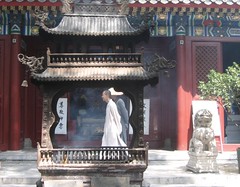
Wang Da Ge (literally Big Brother Wang) was our driver. How many research institutes in NA have drivers? This shows how great a supply of labour there is in China. He was quite a character being of course a competent driver. Turns out he was previously in the army and had spent 2 years in Tibet building communication lines and an oil pipeline. I was impressed to learn he had spent so much time in a harsh but exotic environment.
Hou Hai (Back Sea) was interesting. This is a small waterway near Di An Men (Earth Peace Gate) opposite Tian An Men (Heaven Peace Gate) in the old city. There are many trendy restaurants and cafes and trinket shops. Boats are availabe for rent. Gui and I walked around the entire Hai (sea), reported to be connected to the great canal that links Beijing with the south near Shanghai that was built centuries ago. After leaving the trendy area we came across a hutong (village style buildings) with ordinary people. Farther around the lake we saw various people enjoying the Sunday afternoon. There were many swimmers at one location. Nearby a young boy was taking a wooden flute lesson out in the open right by the water. One wiry young man was showing off his moves on the monkey bars at a little exercise park. We stopped for some water and a yogurt at a little convenience store that had some tables right by the water. A guy from a nearby table walked to the desk and returned to his table with a guitar. Apparently the store rents out guitars. The performer began strumming and singing a folksy, rock version of one of the two Chinese classical children's poems that I know which is about a goose swimming in a pond.
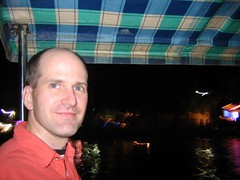
After paddling for a while I noticed that because the paddles were usable by anyone age 10 or over, my knees were complaining due to being scrunched up while paddling. After complaining we headed back but found that we had to make it back through the bottleneck Qing bridge. Unfortunately, there was a lot of boat traffic coming against us plus there were some idiots going with us - one driver repeatedly kept driving head on into oncoming boats and walls! We finally made it back safe and sound.
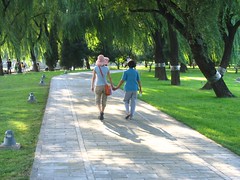
I think that if Beijing addresses some of the major issues such as smog and transportation and doesn't mess itself up too much with lousy urban planning there is hope that in 10 or 20 years it will have emerged from the messy stage of economic development, cleaned itself up, developed modern cultural while preserving its historical legacy, and made a name for itself as a destination that will naturally be on the itinerary of every intelligent and cultured world traveller.
北京照片/Beijing photos.
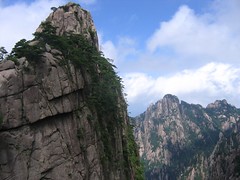

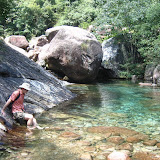
 China 2006 - 北京
China 2006 - 北京 